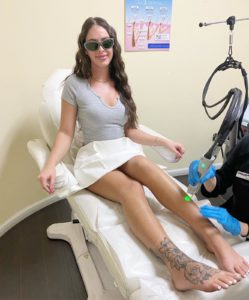Have you ever wondered about the safety and suitability of butthole bleaching for different skin types? This seemingly niche topic has steadily surfaced into broader conversations about body aesthetics and personal grooming. While it might sound extreme or even taboo to some, there’s no denying that it’s a procedure some individuals seek for various personal reasons. So, let’s get to the bottom of it – metaphorically speaking – and discuss the ins and outs of butthole bleaching, its safety considerations, and whether it’s suitable for every skin type.
Understanding Butthole Bleaching
The procedure known as butthole bleaching involves lightening the pigmentation around the anus. People who choose this treatment are often seeking a more uniform complexion around the area for cosmetic reasons. The interest in this aesthetic service has been partly fueled by certain beauty and adult entertainment standards, but it has since found a broader audience.
What Is Butthole Bleaching?
Butthole bleaching isn’t as straightforward as dabbing on some skin lightener and calling it a day. Typically, it involves using specially formulated creams, chemical peels, or laser treatments that lighten the pigmentation around the anus. These treatments work by targeting melanin, the natural pigment responsible for the color of the skin, and reducing its concentration.
Why Do People Choose This Procedure?
The reasons for choosing butthole bleaching can be as varied as the people who elect to undergo the procedure. For some, it’s about achieving a consistent appearance across their entire body for personal satisfaction or confidence. For others, it might tie into broader beauty standards or be purely for personal grooming preferences. At the end of the day, the decision is personal and varies greatly from one individual to another.
Get Your Free Consultation Today
An In-Depth Look at Different Skin Types
Skin types can be classified generally into different categories based on various factors like sensitivity, oiliness, and pigmentation levels. Why is it important to understand your skin type before embarking on a butthole bleaching journey? Because each type responds differently to the chemicals and processes involved in bleaching.
Normal Skin
Normal skin is characterized by a balanced oil to dryness ratio, minimal sensitivity, and an even tone. This skin type generally responds well to various treatments and has a lower risk of adverse reactions. However, it doesn’t mean procedures like butthole bleaching should be undertaken without care or professional consultation.
Dry Skin
Dry skin lacks adequate moisture in its outer layer, causing it to feel flaky or rough. This skin type is less resilient and can react negatively to harsh chemicals or excessive treatments. Special care is needed if you have dry skin, as bleaching agents could exacerbate dryness or even cause irritation.
Oily Skin
Oily skin has larger pores and a shiny appearance due to overactive sebaceous glands. While generally more resilient to external factors, oily skin can be prone to acne and clogged pores. Although bleaching might seem less daunting on this skin type, it’s still essential to proceed with caution.
Sensitive Skin
People with sensitive skin often experience redness, itching, or burning with certain cosmetic products. Sensitive skin demands the utmost care and consideration when undergoing any aesthetic procedure, bleaching included. An allergic reaction or irritation resulting from butthole bleaching could lead to significant discomfort and require medical attention.
Combination Skin
Combination skin features characteristics of more than one skin type, often with an oily T-zone (forehead, nose, and chin) and dryness in other areas. Deciding on cosmetic treatments for combination skin can be tricky, and tailored procedures based on comprehensive skin analysis are advisable.
Safety Concerns Surrounding Butthole Bleaching
When considering butthole bleaching or any cosmetic treatment, the first thing on your mind should be safety. Many misconceptions about the procedure could lead one to underestimate the possible risks involved. Let’s clear up the confusion surrounding this topic.
Potential Risks and Side Effects
The potential risks of butthole bleaching can range from minor irritations to severe complications. Allergic reactions, skin irritation, burns, and scarring are among the known adverse effects. Ensuring proper patch testing, consulting with professionals, and opting for high-quality products are critical steps to mitigate these risks.
Importance of Professional Guidance
Professional guidance can set the stage for a safe and successful bleaching experience. Qualified practitioners, like those at Spoiled Laser in Las Vegas, can evaluate your skin type, recommend the most appropriate treatment, and oversee the process to ensure it unfolds smoothly. Their expertise can prevent many common complications associated with home treatments.
Myths About At-Home Bleaching Kits
At-home bleaching kits may seem like an attractive option due to convenience and cost-effectiveness. However, professional supervision trumps the DIY approach when it comes to minimizing risks and long-term effects. Homemade kits might lack the quality, regulatory oversight, and safety assurance provided by professional treatments.
Suitability of Butthole Bleaching for Various Skin Types
Now that we’ve touched on safety concerns, how does one determine if butthole bleaching is suitable for their skin type? Here’s a deeper dive into assessing compatibility based on skin type.
What Skin Types Are Best for Butthole Bleaching?
While no one skin type is better suited to bleaching than another, healthier and resilient skin types—such as normal or oily skin—might tolerate the procedure better. It’s still crucial for individuals with these skin types to proceed with caution, ensuring they use only recommended products under professional supervision.
Skin Types That Require Caution
Dry, sensitive, and combination skin types require extra care when considering bleaching procedures. The potential for irritation or allergic reactions is higher, making professional consultations even more pivotal to gauge the skin’s reaction to bleaching agents and modify treatment plans accordingly.
Guidelines for Skin Type Specific Care
Before proceeding with any form of butthole bleaching, here are some tailored guidelines to ensure the safety and efficacy based on different skin types:
| Skin Type | Precautions |
|---|---|
| Normal | Perform a patch test; Avoid over-sensitive products. |
| Dry | Enhance moisture; Use less aggressive bleaching agents. |
| Oily | Choose non-comedogenic products; Maintain skin cleanliness. |
| Sensitive | Perform rigorous patch testing; Use hypoallergenic products. |
| Combination | Target treatment according to specific oily/dry areas. |
Professional Treatments Versus At-Home Options
Deciding between professional treatments and home options can significantly impact the outcome for butthole bleaching. Each has benefits and drawbacks worth considering.
Why Opt for Professional Services?
At professional centers like Spoiled Laser, the expertise offered significantly reduces the risk of adverse reactions. With myriad treatments, professional consultations ensure that the chosen method is best suited for your unique skin needs, providing tailored care and monitoring.
Drawbacks of At-Home Bleaching
While at-home bleaching might seem straightforward, it poses several challenges. Incorrect application, inconsistent results, and higher risk of errors emphasize the potential drawbacks. Consider seeking professional evaluation or assistance to ensure you aren’t putting yourself at unnecessary risk with do-it-yourself methods.
Importance of Post-Treatment Care
Regardless of whether you choose professional or at-home treatments, the aftercare is crucial. Keeping the area moisturized, avoiding harsh chemicals, and protective measures are vital to prevent irritation or adverse reactions post-treatment.
Alternatives to Butthole Bleaching
If butthole bleaching seems unsuitable based on your skin type or personal preference, there are alternative approaches to consider for achieving similar cosmetic goals.
Exploring Other Lightening Treatments
There exist other less invasive treatments for skin lightening that could offer similar aesthetic results without the intensity of bleaching. Options like punarnava or liquorice root extracts in creams provide a gentler approach while targeting pigmentation.
Surgical and Non-Surgical Procedures
Plastic surgery methods or treatments like laser resurfacing also serve as alternatives for those aiming for significant changes. Consulting a specialist is crucial to weigh the benefits and potential risks these procedures may carry.
Embracing Natural Skin Tones
Celebrating natural beauty and diversity in skin tones is an increasingly popular narrative in contemporary conversations. Often, the confidence in one’s natural skin without alteration resonates more authentically than conforming to elusive standards.
Taking the Next Step: Making an Informed Decision
Armed with all this insightful information, your decision on whether to undertake butthole bleaching becomes more informed and tailored to your needs. Consider self-awareness, consultation, and safe practices as guiding pillars throughout the decision-making process.
Consulting with a Professional
Before finalizing on the treatment, consulting with a professional from reputable centers like Spoiled Laser ensures that you receive personalized guidance tailored to your unique skin type and aesthetic concerns.
Prioritizing Safety and Well-Being
Always prioritize your safe practices and long-term well-being. Aesthetic treatments should enhance your confidence without compromising skin health. Making informed decisions elevates the experience and aligns it with holistic beauty wellness.
Choosing whether to undergo butthole bleaching involves weighing the benefits against possible risks. With proper understanding and professional guidance, it can be a safe endeavor, but it’s always essential to prioritize your overall skin health over static beauty trends.

